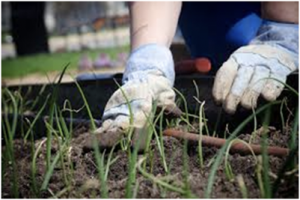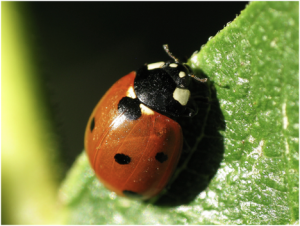I’m pleased to offer this guest post from Denny Avril in South Africa.
5 Natural Ways to Help Control Garden Pests and Diseases
So, you have a very beautiful, colorful garden in front or at the back of your house. Every neighbor walking past is mesmerized by how lively and attracting your garden is. However, even pests and plant diseases seem to have fallen in love with your once healthy garden and won’t leave your flowers and plants alone. What do you do? Call in exterminators or shower your plant with toxic insecticides?

https://www.flickr.com/photos/artofgardens/8011581403
I say, neither! There are organic and natural ways to deal with pests and disease problems in your garden. Many of these have been proven effective for more than a hundred if not thousands of years.
Nowadays, such techniques are called Organic Pest Management (OPM) or Integrated Pest Management (IPM). The fundamental of OPM or IPM is close observation. This simply means that you need to visit your garden every now and then and carefully examine any stressed plant due to a disease or pests.
1. Use good soil for planting
Only choose the best soil and site for the plants you are growing. By doing so, it will reduce plant stress and risk of being infested or attacked by a disease. Too little or too much sun, fertilizer, shade, and water can be the common factor to stress plant. You can use well-aged compost in order to give your plants all essential nutrients naturally. Also, the compost-rich soil is good at draining but also holds the soil moisture. Two times a year, you can add a layer of aged compost of about 2-inch to keep your plants healthy.

https://www.flickr.com/photos/usdagov/5908589011
2. Cleaning and maintaining your garden
Cleaning your garden is great for minimizing pests and controlling diseases. Keep your garden clean of plant debris, and pluck off already dead and dried leaves and branches on plants. If there are dead plants in your garden, remove them immediately. This is because most pest insects take shelter or hide in dead or dropped leaves. You can turn the soil in between plantings in order to expose these pests in the elements.
Also, you there are pests that love to hide in your plants’ leaves and stems. Check your plant twice a week and handpick insects pests such as a large adult insect, caterpillars, snails, slugs and egg masses off your plants put them into soapy water. (Be careful not to pick beneficial insects). For small insects, you can shake the leaves of plants onto a paper and dispose of it.
3. Encourage beneficial insects in your garden
There are two types of insects in the garden: insects that only cause destruction in your garden and insects that eat such destructive insects which can be beneficial to your garden. Release Trichogramma wasps, praying mantis, spined soldier beetles, lacewings or lady beetles in your garden to help control your pest problem.
You should grow plants that provide pollens and nectars for beneficial insects to reside. Most beneficial insects are attracted to lemon balm, spearmint, fennel, caraway and herbs dill. (Here’s another article on beneficial insects.)

https://www.flickr.com/photos/aylesbury_mark/3928709230
4. Use non-toxic sprays
A strong spray of water from a garden hose is the easiest way to remove insects munching on your plant’s leaves and branches. If that does not work, insecticides, horticultural oils and insecticidal soaps made from plant extracts like sabadilla, pyrethrum, or neem are great natural alternatives to toxic, synthetic insecticides.
5. Introduce infectious microorganism
Not microorganisms that can cause human disease but viruses, fungi, and bacteria that is fatal to common garden pests. BT or Bacillus Thuringiensis is the most common bacterial insecticide used in many gardens. These bacteria species produce a toxin that kills many common pests. You can check with your local garden center or nursery for microbial insecticides. Companies that specialized in the above services are necessary as cases like this can’t be properly handled by untrained individuals.
Having a well-organized garden doesn’t end with just it looks, it also needs to be healthy and properly cared for. Without having pest and diseases that could spread to other gardens or within the community. Try our 5 natural ways to help you control your garden pest for a better and greener space for you. And always consider, if you are having problems dealing with it? There are always professionals that can take care of this task.
From The Herb Cottage: If you are having problems with insects you can’t control on your own, try this commercial service for insect control.
Author Bio: Denny Averill is the writer of this article. He loves to write about home cleaning and decor related articles. He also writes for http://extremecleaning.co.za offering pest cleaning and cleaning services in South Africa.
